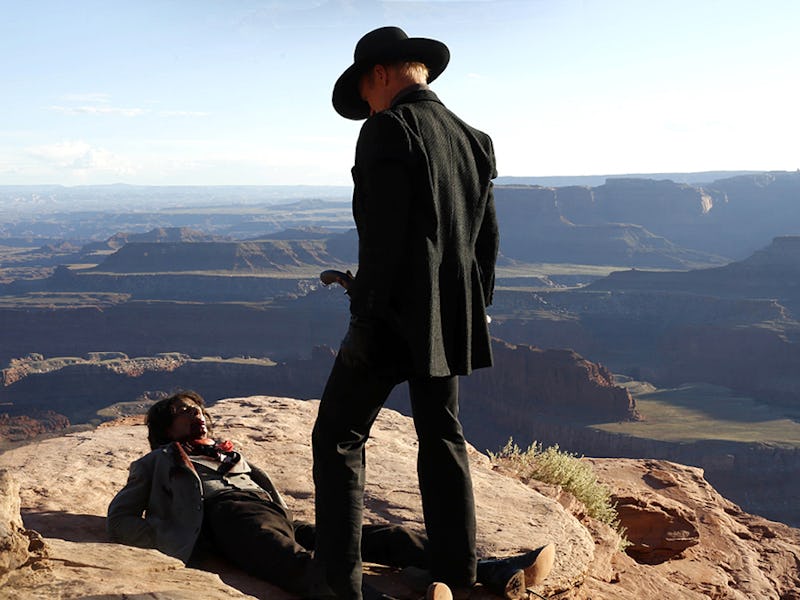There Are No Real Characters in Westworld
Knowing why people do anything at all is now considered a "spoiler."

The myriad mysteries of Westworld have already inspired rabid speculation among viewers, television critics and science fiction fans. The latter group are people like me, who still love to debate if Rick Deckard was or was not really a replicant android in Blade Runner. Unlike Blade Runner, though, this robot story hasn’t presented us with anything to definitively care about on the human level. Westworld might be peak, internet-age TV structure at its finest: each episode gives viewers just enough of a breadcrumb to want to see the next installment. But, with characters who are all essentially question marks, the emotional stakes are impossibly low.
So what do people care about in terms of basic stakes in Westworld? Figuring out who is and isn’t a robot seems to be a great reason to stay invested, but when that first so-and-so-is-really-a-robot domino falls, half the audience probably stops caring about the whole thing. Sure, there are supposedly some other reasons to care, but do they really matter?
In the future of TV criticism, Westworld should probably be judged in the historical lens of how and why cable TV got made in the early 21st Century. The most popular TV shows that have defined recent cable TV success — like Breaking Bad or Game of Thrones — focus on violence and moral ambiguity. Westworld has violence and moral ambiguity for sure, but it also has an even more pervasive cable TV symptom, too: an obnoxious amount of ambiguity. Knowing why people do anything at all is now considered a “spoiler.”
In almost every single storyline, the potential secrets in a character’s hidden past is way more compelling than their possible future. We’re not so much wondering what Dr. Robert Ford will do next, but rather, what he’s already done before the show began. In a sense, this is a Memento-style narrative cheat: figuring out what’s already happened before the plot began becomes the only reason somebody might care about the “plot.”Ford is like the old Great Gatsby figure at a proverbial cocktail party of old west robots.
Nobody really knows him, and his mysterious past is supposed to be really interesting to the audience, because we’re told over and over just how mysterious and confusing he is. And yet, these secrets are presented as intentionally impenetrable. The viewer is forced to just accept the rate at which the information is doled out by the show itself. Will viewers be satisfied when all has been explained by Dr. Ford’s past, what he and Arnold wanted to do? What other bespoke robots has Dr. Ford secretly made? Arguably, the answer to the satisfaction question depends on what you care about more: connecting certain dots which are designed by the writers to be confusing to connect, or the fulfillment of a “good” story, well told.
This self-congratulatory beginning-is-really-the-end narrative stuff is on full display in the parallel narrative trick in which the story of William will-almost-certainly be revealed to be the sneaky flashback origin story of the Man in Black. The idea that Westworld is in fact presenting a flashback story simultaneously with its contemporary story is impressive. Basically, if William and the Man in Black are one-in-the-same, then watching Westworld would be like watching the original Godfather, but being interrupted at numerous points with footage from The Godfather Part II in which the name of the Robert De Niro character is somehow concealed.
Of course, even that analogy isn’t quite right, because at least with The Godfather Part II, we’d recognize a shift with historical clues: clothing, setting, etc. With Westworld, the setting is fairly constant, minus a few logos, meaning you just can’t tell what is flashback and what it isn’t. Again, this could be lauded because it seems new, but it also feels a little bit dumb. In other words, why do we assume great science fiction must rely on the “mindfuck” of having a secret flashback embedded in in its narrative? Is this smart? Or just lazy writing, infusing a false sense of depth? Having an epiphany that these characters are the same man seems pretty shallow.
If we were told from the first episode that William was the Man in Black in the past, it might actually be a better story. Knowing that we are seeing the same character on opposite ends of his life could be profound. Keeping the information out seems like choice that makes care about both versions of the character way less than we could, because we don’t really understand William or the Man in Black at all.
For many, the confirmation or upending of their theories and assumptions is obviously part of the fun. Perhaps Westworld has a good, human story to tell that doesn’t rely on being compelling by being vague. And yet, for now, there seems to be a certain amount of flippancy in regard to being straight with the audience. In other words, Westworld assumes we’re too jaded to care about characters who we understand, and comprehend. It assumes the opposite: that we prefer simulacrums of people, hollow characters going through the motions of stories which they can barely change.